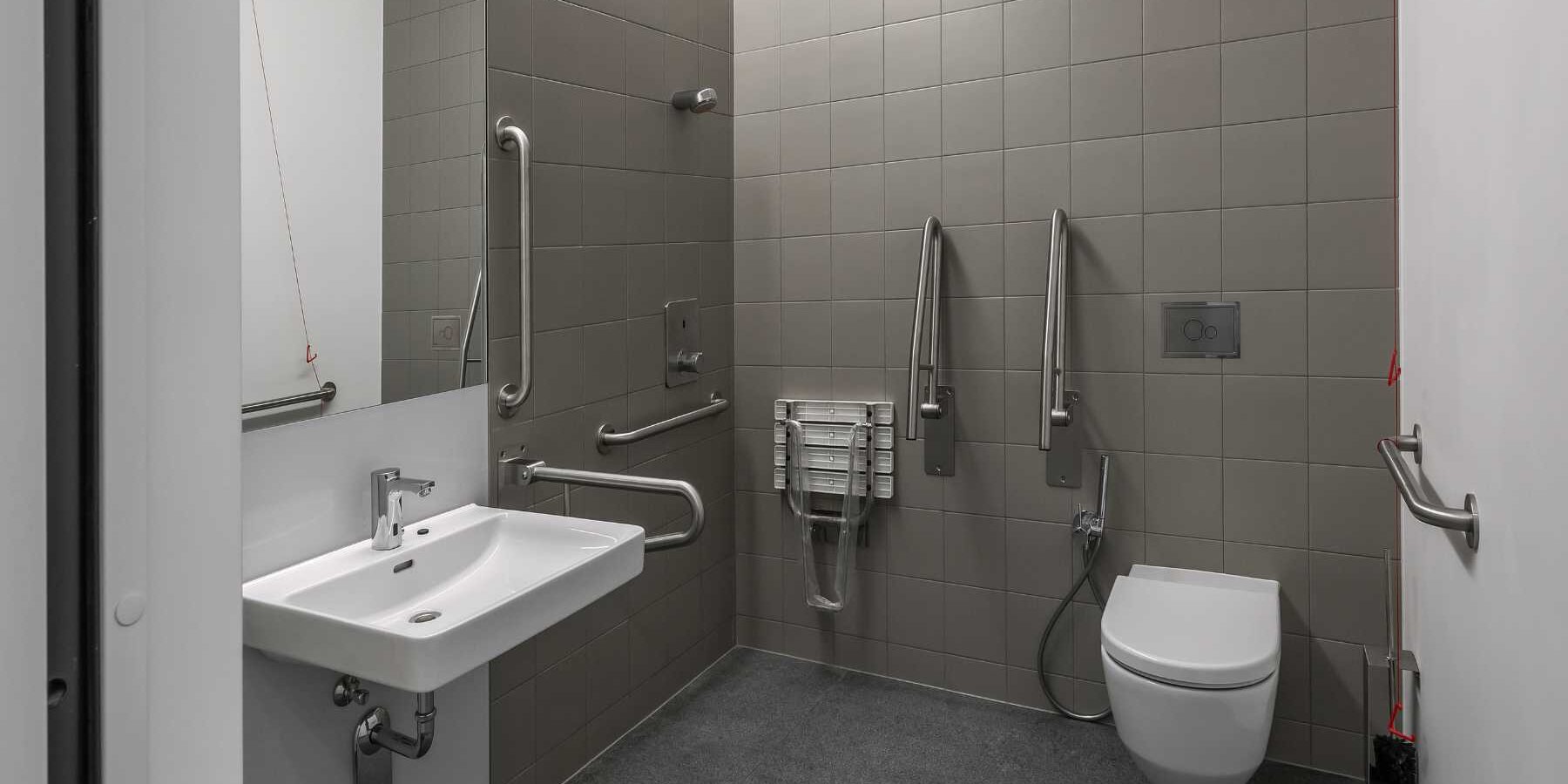What are the Key Differences Across Industries for ADA Bathroom Compliance for Healthcare, Hospitality, and Retail?
Please review the following information to gain a more profound understanding of this particular aspect of ADA Compliance.
The Americans with Disabilities Act (ADA) sets standards to ensure that facilities are accessible to individuals with disabilities. While ADA guidelines apply universally across various sectors, the specific requirements for ADA-compliant bathrooms can differ significantly depending on the industry—be it healthcare, hospitality, or retail. Understanding these nuances is essential for businesses to provide a safe and inclusive environment for all their customers and patients.
1. ADA Compliance in Healthcare Facilities
Healthcare facilities, such as hospitals, clinics, and medical offices, are held to the highest standards of ADA compliance due to the vulnerable nature of their patients. The focus here is on accessibility, safety, and ease of use. Key requirements include:
- Size and Space Considerations: ADA-compliant bathrooms in healthcare settings must accommodate larger mobility aids, such as wheelchairs and walkers. Clear floor space must be available to allow a wheelchair to make a 180-degree turn (a minimum of 60 inches in diameter).
- Grab Bars and Support Structures: Bathrooms in healthcare facilities often need additional grab bars, reinforced walls, and other support structures. This is critical for patients with mobility issues, who may require support when transferring from a wheelchair to a toilet or when moving around the bathroom.
- Specialized Equipment: Some healthcare facilities may require more specialized ADA-compliant equipment, such as raised toilets, non-slip flooring, or adjustable sinks. These considerations help accommodate a wider range of disabilities and ensure patient safety.
- Hygiene and Sanitation: Compliance is also influenced by hygiene and infection control protocols. Features like hands-free faucets, flush systems, and soap dispensers are common in healthcare settings to minimize the risk of cross-contamination.
2. ADA Compliance in Hospitality Settings
The hospitality industry, which includes hotels, restaurants, and resorts, focuses on creating an inclusive and welcoming environment for guests. While ADA compliance is mandatory, the goal is to integrate accessibility with aesthetics and comfort.
- Design and Aesthetics: Hospitality settings often aim to balance ADA compliance with interior design. While grab bars, accessible sinks, and toilets are required, these features are typically incorporated in ways that blend seamlessly with the overall design.
- Guest Room Accessibility: Hotels are required to have a certain percentage of guest rooms that are ADA-compliant, including the bathrooms. These bathrooms must have roll-in showers, lower countertops, and ample turning space for wheelchairs. The design should also include reachable amenities, such as towel racks and toiletries.
- Variety in Accessibility Features: Since the hospitality sector caters to a diverse clientele, it must consider various accessibility needs. This includes providing both tubs with grab bars and roll-in showers in ADA rooms, adjustable shower heads, and seating options in showers.
- Public Area Restrooms: In restaurants, lobbies, and public areas, the restrooms must also meet ADA standards. This includes having at least one accessible stall, proper signage, and appropriate placement of amenities such as sinks, dryers, and mirrors.
3. ADA Compliance in Retail Environments
Retail establishments, including stores, shopping malls, and supermarkets, have a different approach to ADA bathroom compliance, focusing primarily on accommodating a high volume of customers and providing clear access paths.
- Space Efficiency: Given that retail spaces are often constrained by square footage, ADA-compliant bathrooms must be efficiently designed to maximize space while meeting ADA requirements. For example, accessible stalls need to have enough space for a wheelchair to maneuver, and entryways should be wide enough for easy access.
- Signage and Wayfinding: Clear signage directing customers to ADA-compliant restrooms is crucial in retail environments. These signs should be easily visible, with tactile elements like Braille for visually impaired customers.
- Public Access: Unlike healthcare and hospitality sectors where bathrooms may be more private, retail environments usually provide restrooms for public use. This necessitates a focus on durability, easy maintenance, and accessibility, ensuring that fixtures such as sinks, soap dispensers, and hand dryers are within reach of all users.
- Self-Contained Spaces: Many retail stores are now opting for unisex or family restrooms that are fully accessible. These self-contained spaces are more accommodating for individuals who require assistance or families with young children, ensuring privacy and ease of use.
Conclusion
While ADA compliance is a non-negotiable standard across all industries, the specific requirements for ADA bathrooms differ based on the unique needs and customer experiences within each sector. Healthcare facilities prioritize safety, sanitation, and specialized accessibility; hospitality settings blend accessibility with comfort and design; and retail environments focus on efficiency, public access, and clear navigation.
For businesses and organizations, understanding these distinctions is key to adhering to ADA regulations and creating an inclusive, welcoming environment for all individuals, regardless of their physical abilities.
Learn how Modern Construction & Facilities Maintenance Services can help you meet your Facilities ADA Compliance requirements today.
Visit us and fill out the form to get an ADA Compliance Analysis from our expert team!
Modern Construction & Facilities Maintenance Services is well-positioned to help our clients with any renovations, professional design, space repurposing, construction, interior refreshes, or maintenance issues for our healthcare clients. Reach out to us 24/7/365 and see how we make facility maintenance and construction easy!
www.modernconstructionsvc.com
704-765-9937
Modern Construction & Facilities Maintenance Services
5900 Harris Technology Blvd, Suite D
Charlotte, NC 2869








